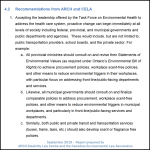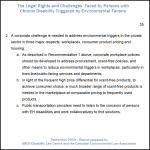“Accepting the leadership offered by the Task Force on Environmental Health to address the health care system, proactive change can begin immediately at all levels of society including federal, provincial, and municipal governments and public departments and agencies.
These would include, but are not limited to, public transportation providers, school boards, and the private sector.”


screenshots
of the report recommendations
with source added
The Legal Rights and Challenges Faced by Persons with Chronic Disability Triggered by Environmental Factors
From ARCH Disability Law Centre and the Canadian Environmental Law Association (CELA), September 2019
“3. Conclusion While there has been significant research and study into barriers to include persons with EH disabilities, critical obstacles remain.
Seeking help in the health system, trying to find and/or retain adequate housing or employment, entering public spaces, shopping, or using public transportation, limit the inclusion of persons with EH disabilities in our communities.
Much more needs to be done to acknowledge the significant hurdles faced by persons with EH disabilities.




